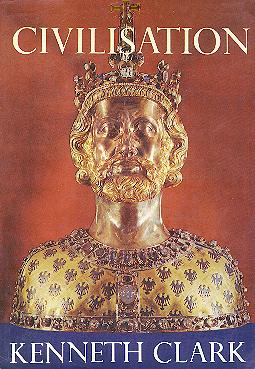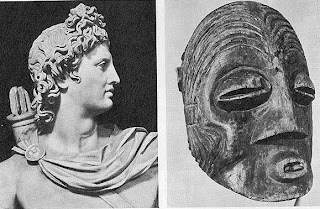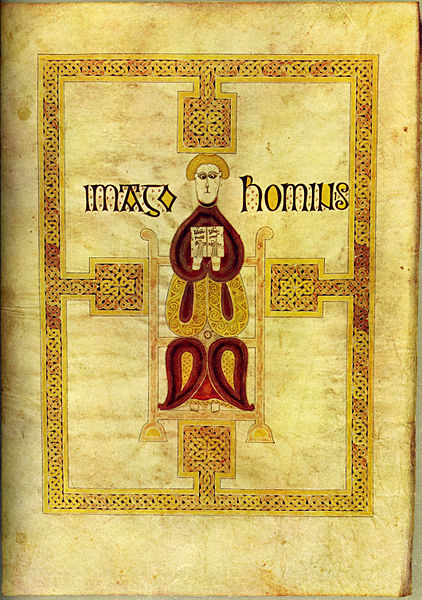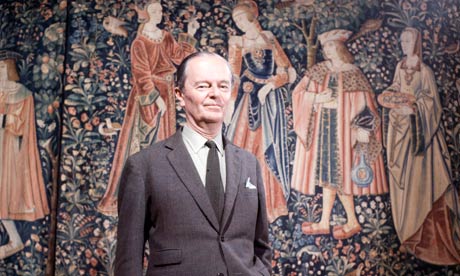
For an introduction to these series, see here.
Below, some indented excerpts of “The Skin of our Teeth,” the first chapter of Civilisation by Kenneth Clark, after which I offer my comments.
Ellipsis omitted between unquoted passages:
I am standing on the Pont des Arts in Paris.
What is civilisation? I don’t know. I can’t define it in abstract terms—yet. But I think I can recognize it when I see it; and I am looking at it now.
If I had to say which was telling the truth about society, a speech by a Minister of Housing or the actual buildings put up in his time, I should believe the buildings. But this doesn’t mean that the history of civilisation is the history of art—far from it. Great works of art can be produced in barbarous societies.

Whatever its merits as a work of art, I don’t think that there is any doubt that the Apollo embodies a higher state of civilisation than the mask. They both represent spirits, messengers from another world—that is to say, from a world of our own imagining. To the Negro imagination it is a world of fear and darkness, ready to inflict horrible punishment for the smallest infringement of taboo. To the Hellenistic imagination it is a world of light and confidence, in which the gods are like ourselves, only more beautiful.
It is not my intention to insult white nationalists. But what they ignore is that, presently, with their rock music and media tastes they themselves, like the overwhelming majority of the white population are, spiritually, far closer to the Negro mask than to the Apollo of Belvedere. For Lord Clark it would have been unthinkable to consider civilised the popular forms of cultural expression such as heavy metal and the movies that today are watched even by white nationalists throughout the West.
As we saw in some of my latest entries, other self-destructing forms of cultural expression already occurred in the times of the fall of the Roman Empire. Clark said:
The same architectural language, the same imagery, the same theatres, the same temples—at any time for five hundred years you could have found them all round the Mediterranean, in Greece, Italy, France.
What happened? It took Gibbon six volumes to describe the decline and fall of the Roman Empire, so I shan’t embark on that. But thinking about this almost incredible episode does tell one something about the nature of civilisation. It shows that however complex and solid it seems, it is actually quite fragile. It can be destroyed. What are its enemies? Well, first of all fear—fear of the supernatural, which means that you daren’t question anything or change anything. The late antique world was full of meaningless rituals, mystery religions, that destroyed self-confidence.
Unlike Gibbon and Nietzsche, before his TV audience Clark didn’t dare to point the finger at Christianity. But later in the program, Clark spoke about Islam:
In a miraculously short time—about fifty years—the classical world was overrun [by the Muslim conquests]. Only its bleached bones stood out against the Mediterranean sky. The old source of civilisation was sealed off, and if a new civilisation was to be born it would have to face the Atlantic.
But something very odd happened to Man’s self-image in the early medieval world facing the Atlantic in what today is Ireland. According to Clark:
The subject of Mediterranean man was man. Two hundred years have passed—perhaps a little more—and man has almost vanished.
Crude as this imago hominis may be when compared to the Apollo, presently some white nationalists advertise their blogs with soft-porn pics of semi-nude women: something far more degrading for the divine human figure than the image of 8th century insular art in the Echternach Gospels.
 To my mind—and, like Clark, I must say that this is only my personal view—, the imago hominis only means a psychogenic regression in Man’s understanding of himself compared to the Greeks and the Romans. However, the white nationalists’ soft porn spits on the avatar of God, even if I don’t believe in the existence of a personal god.
To my mind—and, like Clark, I must say that this is only my personal view—, the imago hominis only means a psychogenic regression in Man’s understanding of himself compared to the Greeks and the Romans. However, the white nationalists’ soft porn spits on the avatar of God, even if I don’t believe in the existence of a personal god.
After the above image chosen by Clark for the first episode of his program, in the following pages of the book version Clark mentions how St. Gregory destroyed entire libraries of the classical world (I quoted part of it in my recent antichristian series, here), and on the next page he states that even in those obscure days the Europeans fought strenuously against their enemies:
All great civilisations, in their early stages, are based on success in war. The Romans were the best organised and most ruthless fighters in Latium. So it was with the Franks. Clovis and his successors not only conquered their enemies, but maintained themselves by cruelties and tortures remarkable even by the standards of the last thirty years.
Without Charles Martel’s victory over the Moors at Poitiers in 732, western civilisation might never have existed, and without Charlemagne’s tireless campaigns we should never have had the notion of a united Europe.
Charlemagne was the first great man of action to emerge from the darkness since the collapse of the Roman world. The old idea that he saved civilisation isn’t far wrong. On the whole, our whole knowledge of ancient literature is due to the collecting and copying that began under Charlemagne.
If we compared ourselves with the franks, what could it be said about present-day nationalists? Many of them don’t even let our most serious fighter discuss in their forums (by “serious fighter” I mean someone who’s actively planning a revolution). Didn’t the Führer say that those who want to live, let them fight, and that those who do not want to fight in this world of eternal struggle do not deserve to live? Do whites and white nationalists deserve to live? If so, where are the Charles Martels in today’s islamized Europe, in America’s mexicanized states?
I am not proposing to do something stupid in a world which media is a hundred percent dominated by the Enemy. But at least be prepared for the tough, revolutionary times that are coming after the dollar crashes.
 By “art” I mean an evolved sense of beauty which is almost completely absent in today’s nationalists. Most of them are quite a product of Jewish modernity whether with their music, lifestyles or Hollywood tastes, to a much greater degree than what they think. For nationalism to succeed an evolved sense of female beauty has to be the starting point to see the divine nature of the white race. In Clark’s own words, “For all these reasons I think it is permissible to associate the cult of ideal love with the ravishing beauty and delicacy that one finds in the madonnas of the thirteenth century. Were there ever more delicate creatures than the ladies on Gothic ivories? How gross, compared to them, are the great beauties of other woman-worshiping epochs.”
By “art” I mean an evolved sense of beauty which is almost completely absent in today’s nationalists. Most of them are quite a product of Jewish modernity whether with their music, lifestyles or Hollywood tastes, to a much greater degree than what they think. For nationalism to succeed an evolved sense of female beauty has to be the starting point to see the divine nature of the white race. In Clark’s own words, “For all these reasons I think it is permissible to associate the cult of ideal love with the ravishing beauty and delicacy that one finds in the madonnas of the thirteenth century. Were there ever more delicate creatures than the ladies on Gothic ivories? How gross, compared to them, are the great beauties of other woman-worshiping epochs.”

